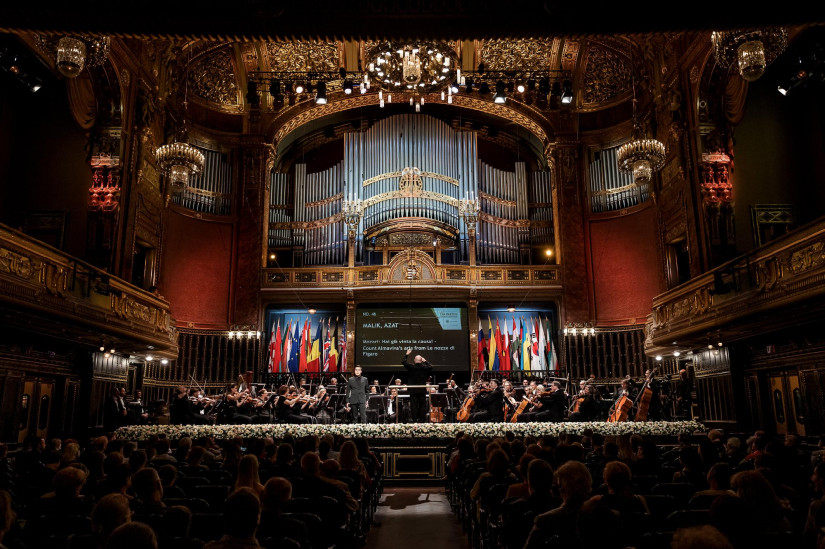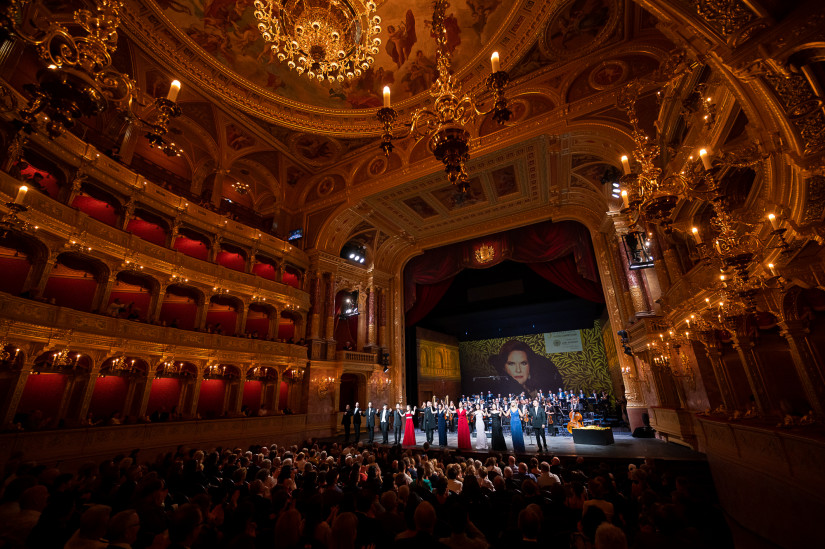The Liszt Academy’s Éva Marton International Singing Competition Celebrates Milestone
This year marks the tenth anniversary of the biennial competition, and to commemorate this occasion, we spoke with world renowned opera singer, Professor Emerita Éva Marton – whose name the competition bears - about the significance of the event, which will be held for the sixth time from September 1 to 8.
- How do you evaluate the past decade and the path that the singing competition has so far taken?
- We organized the inaugural competition in September 2014, just a year after the renovated Liszt Academy building reopened. Buoyed by its success, we decided to hold it biennially, drawing inspiration from international models. We faithfully executed this plan: by the time we held the second and third competitions in September 2016 and September 2018, it was evident that our event had ascended to the ranks of the world's premier opera competitions. It attracted numerous applicants and achieved a level of global recognition comparable to only the largest competitions. Due to its success, the Éva Marton International Singing Competition was inducted into the World Federation of International Music Competitions (WFIMC) in 2019. This milestone, the first for our country, was a testament to the dedication and effort we had invested. Despite the challenges posed by the COVID-19 pandemic, which necessitated postponing the fourth competition by a year, we were determined to uphold the biennial schedule and successfully hosted the fifth competition in September 2022. By then, at the WFIMC General Assembly, the Éva Marton International Singing Competition was not only represented but also received high praise for its professionalism and organization. The international jury and audience alike noted with satisfaction that the competition's standards and the contestants' preparedness continued to rise.
- What is your opinion of the work of the Liszt Academy as the organizer of the event?
- The collaboration in the preparation and execution of the competition has been excellent from the beginning. Initially, the communication team, led by Imre Szabó-Stein, organizer Beáta Schanda, program director András Csonka, and project manager Yvette Hintalan-Mondok, all performed at a high level. By 2018, the framework of the team changed; Imre Szabó-Stein, the former communications director, directed international PR in an advisory capacity, and his team, which had earlier proven its excellence, worked externally. Later, communications tasks were taken over by the new communications director of the Liszt Academy, Júlia Torda, and her team. After the sad passing of Beáta Schanda, Judit Dávid, the artistic secretary, took over her role and continues to perform it at a high level to this day. The live rounds are conducted at a high standard and can be followed worldwide via live internet broadcasts, thanks to Gergely Lakatos and his team at the Liszt Academy’s scenic directorate. Additionally, Bartók Radio and the M5 TV channel regularly feature the event in their programming.

- The competition has garnered extraordinary global interest, with nearly two hundred applicants from almost every continent. What are your impressions of them?
- Indeed, a total of 106 female and 90 male singers from around the world have submitted valid applications. In terms of nationality, Koreans are the most represented with 44 applicants, followed by 30 Chinese, 18 Russians, and an equal number of Hungarians, as well as ten Ukrainians forming the largest groups. Numerous applications have also come from citizens of the United States, Germany, Kazakhstan, and Croatia, and there have been submissions from South Africa, Canada, Brazil, Australia, and Thailand. There is also a great variety of vocal ranges among the applicants, and out of the 196 singers, 36 are returning applicants, with six competing for the third time. This year, as in previous years, there are many talented and well-prepared singers among them. The preliminary jury, consisting of opera singer Péter Fried, conductor Péter Halász, and myself, has approved a relatively high number of 84 applicants to advance to the live rounds of the competition. Previously, opera singer Attila Kiss-B. and conductor Balázs Kocsár also participated in the work of this panel, for which I am grateful. The fact that the majority of applicants generally come from Asia, as well as from Russian and Ukrainian regions, not only in my competition but also in other similar significant events, can perhaps be attributed to their larger numbers and their eagerness to seize every opportunity to break through in hopes of advancing their careers.
- The repertoire is quite broad, and it includes Liszt songs as a mandatory element. What is the reason for these two aspects?
- This is to emphasize that the competition is held at the prestigious music institution, the Liszt Academy, founded by Franz Liszt himself in 1875, which is unique in the world. As a Hungarian singer and alumnus of this school, Franz Liszt is important to me for several reasons and is personally one of my role models. What he achieved through music in his century and what he did for Hungary with his wonderful, charismatic personality is an example for all of us. There are also professional reasons for making a Liszt song mandatory in the singing competition. Liszt wrote songs in multiple languages and styles, so everyone can choose the one that suits them best from the French, German, or Italian repertoire.
- What is the role of such a large-scale, international competition in this day and age? Can the jury members, who are well-acquainted with you and represent significant institutions around the world, possibly notice a competitor?
- Winning a prize in the competition has provided genuine support for the majority of awarded contestants in their careers. These young singers have received and continue to receive invitations from the best opera houses. This is because the international jury comprises both Hungarian and foreign luminaries of the opera world. Miguel Lerín, one of the most influential Spanish art managers, has been a long-time acquaintance and a good friend of mine. Peter Mario Katona, the casting director of the Royal Opera House in London, once recommended me to Christoph von Dohnányi, who subsequently hired me in Frankfurt. Other jury members include Anatoli Goussev, a tenor and singing master born in Ukraine and now living and working in Italy; Christina Scheppelmann, a German music manager, former artistic director of the Liceu opera house in Barcelona, and currently the general director of Seattle Opera; Vittorio Terranova, an Italian tenor with whom I sang in Florence in 1972; and Dmitrij Vdovin, director of the young artist program at the Bolshoi Theatre, where I have conducted several masterclasses. From Hungary, we have Andrea Meláth, a mezzo-soprano and head of the Vocal Department at the Liszt Academy, who is thus my successor, and Szilveszter Ókovács, general director of the Hungarian State Opera, with whom I have had a good relationship since 2014, serving as his chief advisor.

- Will you be holding a masterclass for the contestants this year?
- Unfortunately, I won’t be able to hold a masterclass this year because I have to honor an invitation immediately following the singing competition. I will be conducting a special masterclass for the awardees of the Vinas Singing Competition at the Teatro del Liceu in Barcelona. However, I hope to find two foreign contestants to join the Éva Marton Opera Studio, which starts in the fall. My relationship with the contestants does not end once the competition is over. They reach out to me personally or through the Liszt Academy for advice or to develop their roles, and they keep me updated on their career progress. I am always happy to see them, to help them, and I never accept any fees for this. The future of opera performance is much more important to me. Not least, this is also the purpose of the singing competition that bears my name. I would like to take this opportunity to thank those who supported me in making my dream come true: the Prime Minister’s Office, personally Prime Minister Viktor Orbán, the MOL – New Europe Foundation for supporting the last two competitions and hoping that our cooperation will continue to be fruitful in the future, the institution providing the venue, my alma mater, the Liszt Academy, former president Prof. Dr. András Batta for the initiative, Prof. Dr. Andrea Vigh former president for her continued support, as well as the Hungarian State Opera and General Director Szilveszter Ókovács for organizing the gala. Thanks to the media for their generous support, and last but not least, for the dedicated and high-quality work of the organizing team at the Liszt Academy led by András Csonka. The exemplary collaboration has borne fruit. We will continue to put the trust and opportunities we have received to the best of use in order to represent our country.


